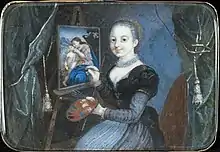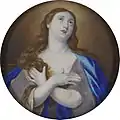Catherine da Costa
Catherine Rachel da Costa (1679–1756), née Mendes, was an English miniaturist. She grew up in London and studied painting under Bernard Lens III. Most of her surviving portraits are of family and friends, and there is also a picture of Mary Queen of Scots. Da Costa was the first female Anglo-Jewish artist of note. In her personal life, she married Moses da Costa and had six children.
Catherine da Costa | |
|---|---|
 Self-portrait attributed to Catherine da Costa | |
| Born | Catherine Rachel Mendes 1679 London, England |
| Died | 1756 (aged 76–77) London, England |
| Nationality | English |
| Other names | Catharina da Costa, Catherine Rachel da Costa |
| Occupation | Miniaturist |
Early life

Catherine Rachel Mendes was the eldest daughter of Fernando and Isabel Mendes, Portuguese Jews who had fled the Spanish Inquisition and married in London.[1][2] Her father was doctor to both King Charles II and Queen consort Catherine of Braganza, having converted to Roman Catholicism. Catherine Mendes was baptized at Somerset House (but given the Jewish name of Rachel) and Catherine of Braganza became her godmother.[1]
The family lived between Budge Row in the City of London and Highgate House (later known as Cromwell House), sharing the houses with Fernando Mendes' cousin Alvaro da Costa and raising the children as Jews. On 13 August 1698, Catherine Mendes married da Costa's son Moses da Costa in a synagogue.[1] Moses da Costa was a wealthy merchant and together with him, Catherine da Costa had six children.[3]
Career
Catherine da Costa was taught to paint miniature portraits by Bernard Lens III and most of her surviving works are portraits of friends and family.[1][4] These include a miniature of her ten year-old son Abraham da Costa which is now owned by the Jewish Museum. However, a full-length watercolour portrait of her father hangs in the Bevis Marks Synagogue and da Costa also painted the Imaginary Portrait of Mary, Queen of Scots (1542–1587), which hangs at Ham House in Surrey.[5][6][7]
Da Costa was well-regarded as a painter and also impressed Voltaire with her wit when he visited London in the mid-1720s.[1][8] He recorded an exchangea between her and a priest in his notebooks:
Madame Acosta [sic] said in my presence to a cleric hoping to convert her to Christianity:
- "Was your God born Jewish?"
- "Yes"
- "Did he die Jewish?"
- "Yes"
- "Well then, become Jewish"
Death and legacy
Catherina da Costa died on 11 December 1756 and was buried in the Mile End Jewish cemetery. Her son Abraham inherited her artworks and some are now owned by the Joods Historisch Museum in Amsterdam. She was the first female Anglo-Jewish artist of note.[1]
A book called Smitten by Catherine was published in 2016 about her life and work.[9]
Gallery
 Allegory of summer, 1713
Allegory of summer, 1713 The Penitent Magdalene, 1714
The Penitent Magdalene, 1714.jpg.webp) Portrait of Alvaro Lopes Suasso (1696-1751), 1718 (Joods Historisch Museum)
Portrait of Alvaro Lopes Suasso (1696-1751), 1718 (Joods Historisch Museum)
Notes
References
- "Costa [née Mendes], Catherine [Rachel] da". Oxford Dictionary of National Biography (online ed.). Oxford University Press. doi:10.1093/ref:odnb/72024. (Subscription or UK public library membership required.)
- "Mendes, Fernando Moses". Oxford Dictionary of National Biography (online ed.). Oxford University Press. doi:10.1093/ref:odnb/18553. (Subscription or UK public library membership required.)
- "Costa, Anthony Moses da". Oxford Dictionary of National Biography (online ed.). Oxford University Press. doi:10.1093/ref:odnb/39728. (Subscription or UK public library membership required.)
- Wieseman, Marjorie E. (2018). "Bernard Lens's Miniatures for the Duke and Duchess of Marlborough". Journal of Historians of Netherlandish Art. 10 (2). doi:10.5092/jhna.2018.10.2.3. Archived from the original on 22 August 2020. Retrieved 22 August 2020.
- Adler, Cyrus; Singer, Isidore (1964). The Jewish Encyclopedia: A Descriptive Record of the History, Religion, Literature, and Customs of the Jewish People from the Earliest Times, Volume 4. Ktav. p. 289.
- "Costa, Catharina da". Benezit Dictionary of Artists. 31 October 2011. doi:10.1093/benz/9780199773787.article.B00042952.
- "Lens [Laus] family". Oxford Dictionary of National Biography (online ed.). Oxford University Press. doi:10.1093/ref:odnb/66537. (Subscription or UK public library membership required.)
- Hemming, T. D.; Freeman, E.; Freeman, Ted; Meakin, David (1994). The Secular City: Studies in the Enlightenment : Presented to Haydn Mason. University of Exeter. p. 47. ISBN 978-0-85989-416-6. Archived from the original on 22 August 2020. Retrieved 22 August 2020.
- Gibbs, Stephanie (6 March 2017). "Book review: 'Smitten by Catherine'". Jewish Journal. Archived from the original on 22 August 2020. Retrieved 22 August 2020.
Further reading
- Lang, Andrew (1906). "Portraits and Jewels of Mary Stuart". The Scottish Historical Review. 3 (11): 274–300. ISSN 0036-9241.
- Rubens, Alfred (1953). "Francis Town of Bond Street (1738–1826) and his family: With Further Notes on Early Anglo-Jewish Artists". Transactions (Jewish Historical Society of England). 18: 89–111. ISSN 2047-2331.